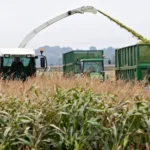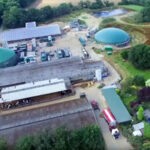Useful links


Useful links
We have collated a selection of press articles and industry reports about anaerobic digestion and biogas, including press coverage of catastrophic accidents and incidents that have taken place in the UK.
Plant urges people to stay away in wake of Oxfordshire fireball

Bosses at an Oxfordshire food recycling plant have urged locals to stay away from the site after a massive fire caused by a freak thunderbolt.
It came as drone footage has revealed the scale of destruction caused by the explosion.
Shocked residents shared video and images on social media showing flames from the major fire in the north west of the county on Monday night.

Explosion at Oxfordshire recycling plant after lightning strike

A lightning strike has caused a huge gas explosion at a food waste recycling plant in Oxfordshire.
Witnesses reported seeing a fireball light up the night sky after the blast at the Severn Trent Green Power Plant at Cassington, north of Oxford.
The company said the strike caused one of its biogas tanks to explode at about 19:20 BST.

Joint Declaration from Energy Importers and Exporters on Reducing Greenhouse Gas Emissions from Fossil Fuels

The United States, European Union, Japan, Canada, Norway, Singapore, and the United Kingdom are committed to taking rapid action to address the dual climate and energy security crises that the world faces.
We also recognize that under IPCC 1.5°C-aligned scenarios, fossil fuel consumption will persist, at rapidly declining levels, as the global energy transition unfolds. As such, we emphasize that dramatically reducing methane, CO2, and other greenhouse gas emissions across the fossil fuel energy value chain is a necessary complement to global energy decarbonization in order to limit warming to 1.5°C.

BAD ENERGY – Defining the true role of biogas in a net zero future

In the UK, the AD industry portrays itself as both a panacea for difficult-to-decarbonise sectors like heating and transport – by providing a sustainable source of power – and a solution to organic waste management – for multiple sectors from livestock farming to retail…

How a false solution to climate change is damaging the natural world

Consider, when you read that, that the average capacity of an offshore wind turbine is four megawatts. Four hundred and fifty hectares of land or one concrete pillar in the seabed – can there be any doubt about which is the better option?

George Monbiot, The Guardian, 2014
A Review of Environmental Incidents at Anaerobic Digestion (AD) Plants and Associated Sites between 2010 and 2018

The Environment Agency has responded to a significant number of incidents which have caused or had potential to cause pollution. We have undertaken routine compliance visits that have identified serious failures which posed a serious risk of pollution or harm to human health.

Environment Agency, September 2019
The great green guzzler con

The great green guzzler con: Monster digesters are meant to guzzle up waste and churn out eco-friendly energy… but they are fed with CROPS, produce pitiful levels of power, cost YOU £216m in subsidies and HARM the environment

The Mail online, December 2016
‘Thick, black tarry stuff flowed down our stream’: how slurry spills affect the land

The Whittemores were hoping for an ‘idyllic lifestyle’ farming in Sussex. Instead, noxious byproducts from a biogas farm poisoned their land

What the muck! Eco-friendly university power station explodes covering the area with stinking cows’ poo

An eco-friendly power station suddenly exploded this morning showering the surrounding area with hundreds of tonnes of stinking cow dung. The blow out in a slurry processing tank happened in the early hours at the plant outside Harper Adams University near Newport in Shropshire.

The misbegotten promise of anaerobic digesters

Federal agencies and state governments are spending millions on anaerobic digesters to wring renewable energy from animal poop. But critics say “cow power” from factory farms is neither clean nor green.

Is this Herefordshire’s least talked about environmental problem?

ANAEROBIC digestion plants are contributing to one of the worst problems facing Herefordshire, according to a former county council leader. Several councillors raised concerns over the environmental impact these units are having at cabinet on December 1 while they discussed the county’s future minerals and waste local plan.

Herefordshire Times, December 2020
10,000 fish dead after toxic pollution spill in Devon river

Thousands of fish were left floating on the surface of the water along the River Mole near South Molton last month after a toxic substance got into the water. The Environment Agency has now revealed that the pollutant was “anaerobic digestate”, a substance created via anaerobic digestion which can be used as a fertiliser.

Avonmouth explosion: Investigation after four killed in blast

Investigations are continuing into what caused an explosion at a waste water treatment works that killed four people. Three employees of Wessex Water and a contractor were killed in the blast at a water recycling centre in Kings Weston Lane, Avonmouth, on Thursday. The explosion happened at 11:20 GMT in a silo that held treated biosolids.

Lightning strike at Agrivert AD plant

A digester at Agrivert’s Wallingford anaerobic digestion (AD) plant was struck by lightning on Thursday evening (16 June), causing a ‘short but intensive’ fire at the biogas plant. The incident has led to warnings from AD sector experts over potential safety hazards at plants.

Biogas Boom in Germany Leads to Modern-Day Land Grab

Creating energy from corn once seemed like a revolutionary idea in Germany. But subsidies for the biogas industry have led to entire regions of the country being covered by the crop, and investors are eagerly waiting for local farmers’ land to go for sale. Some of those farmers who lease their land say they have been “ruined.”

Spiegel International, August 2012
Six Reasons Anaerobic Digesters Aren’t as Environmentally Friendly as You Think

As organisations with large amounts of food waste start investigating how to dispose of the waste other than sending it to a landfill, reducing their carbon footprint is probably front of mind. When organic waste is sent to a landfill it decomposes anaerobically, producing methane (CH4), a gas that is 87 times worse for the atmosphere than carbon dioxide (CO2). To reduce emissions of this greenhouse gas there are three main alternatives, but these processes are not equal

Public consultation launched over plans to reduce odour pollution from anaerobic digester

THE OWNERS of Basingstoke’s much-maligned Anaerobic Digester have submitted plans to try and reduce odour pollution.
The plant, near Farleigh Wallop, has had frequent complaints in recent months, which culminated in two councillors calling for it to be closed…. Cllr Putty said that whilst walking around the area, the smells have progressively got worse, and that he and residents are at “the end of (their) tethers”.

AD plant HSE inspections – what you need to know

The HSE is running an inspection campaign on farm AD plants and intends to visit 50 farm sites. Find out what the inspections will include, how you’ll be notified of a visit and what training is available.
Although AD technology has been used for many years in other sectors it is relatively new to farming. The presence of large amounts of flammable gas in pipework and vessels is not a common farming risk. It requires careful and planned management.
Inspections found a 50% non-compliance rate.
